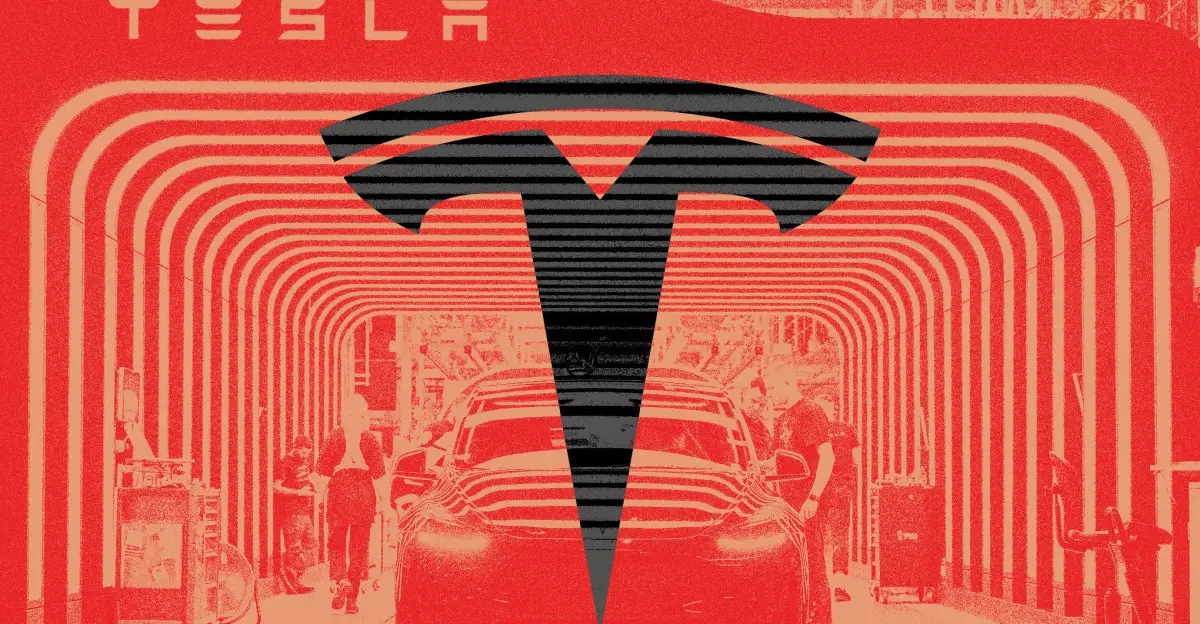Tesla, the electric vehicle pioneer, is currently facing a dire sales crisis in Europe, with figures plummeting by nearly 50% year-over-year. This steep decline in registrations is not merely a statistical anomaly; it highlights a systemic failure within the company that could have far-reaching implications for its standing in the global automotive market. With 7,261 new vehicles registered in April—a stark contrast to the same month the previous year—Tesla’s decline speaks volumes about the challenges it is grappling with in a rapidly evolving market.
This downturn is particularly concerning when placed against the backdrop of a growing appetite for electric vehicles (EVs) among European consumers. In fact, overall battery-electric vehicle sales surged by 26.4%, capturing 15.3% of the EU market share in early 2025. It is evident that the shifting dynamics in consumer preference and the rising tide of EV enthusiasm are not translating into success for Tesla. Instead, multiple factors, from increasing domestic competition to strategic missteps by the company’s leadership, are at play.
Competition: Encroaching Rivals and Lost Market Share
One cannot ignore the significant threat posed by an influx of competitors both from established automotive giants and emerging players, particularly from China. Local manufacturers are ramping up electric vehicle production and aggressively targeting the market share that Tesla once dominated. This surge of competition offers consumers more choices, often at competitive prices or with features that Tesla models lack.
In action, this shift can be seen in the rise of brands like Volkswagen, BMW, and upstart companies from China, who are significantly investing in EV technology and marketing. As a result, consumers have shifted their attention toward these rival brands, and Tesla’s market share has taken a hit. The once-loyal customer base appears to be diversifying its preferences, seeing other brands as legitimate contenders for their attention and purchase decisions.
Musk’s Political Debacle: Reputation at Risk
Adding fuel to the fire, CEO Elon Musk’s recent forays into political waters could be detrimental to the brand’s perception in Europe. By openly aligning himself with parties and initiatives that may not resonate with a significant segment of European consumers, Musk seems to be alienating Tesla from a demographic that values progressive environmental standards and corporate integrity.
While attempts to engage in politics may have been perceived as ambitious or strategic, the backlash has been significant. A recent Reuters/Ipsos poll revealed that a considerable 58% of respondents hold an unfavorable view of Musk, which is alarming given that a brand’s image is often intrinsically linked to its leadership. This perceived association with controversial political stances may turn potential customers away and sow distrust in what Tesla represents.
The Model Y: Misguided Expectations?
Compounding these issues is Tesla’s recent strategy surrounding the refreshed Model Y. Despite expectations that this update would lure in customers, the anticipated sales boost hasn’t materialized. The optimism surrounding the rollout of the new model appears to have been misguided, suggesting a disconnect between leadership expectations and market realities.
Musk’s assertion during the last earnings call that sales would rebound post-launch can be construed as an overly simplistic view of the complex landscape Tesla is operating within. While factory updates may stabilize production challenges, they will not cure the root problems of brand perception or rival competition. A company’s recovery is rarely contingent solely on production outputs; consumer loyalty and brand image play critical roles.
Looking Ahead: Prospects and Strategies
As Tesla navigates this tumultuous period, the company must reassess its foundations and adopt a strategy that prioritizes rebuilding its damaged reputation while responding to the changing market dynamics. Focused investment in customer relations and regional marketing efforts could help revitalize its brand perception. Moreover, engaging with emerging technologies should not overshadow the necessity of maintaining a strong consumer connection.
Ultimately, Tesla stands at a crossroads where its future reliance on innovation and embracing customer sentiments will dictate if it can emerge from this crisis unscathed or if it will continue down a perilous path. The brand is not beyond recovery, but decisive action is crucial if it hopes to reclaim its once unassailable position in the electric vehicle landscape.

